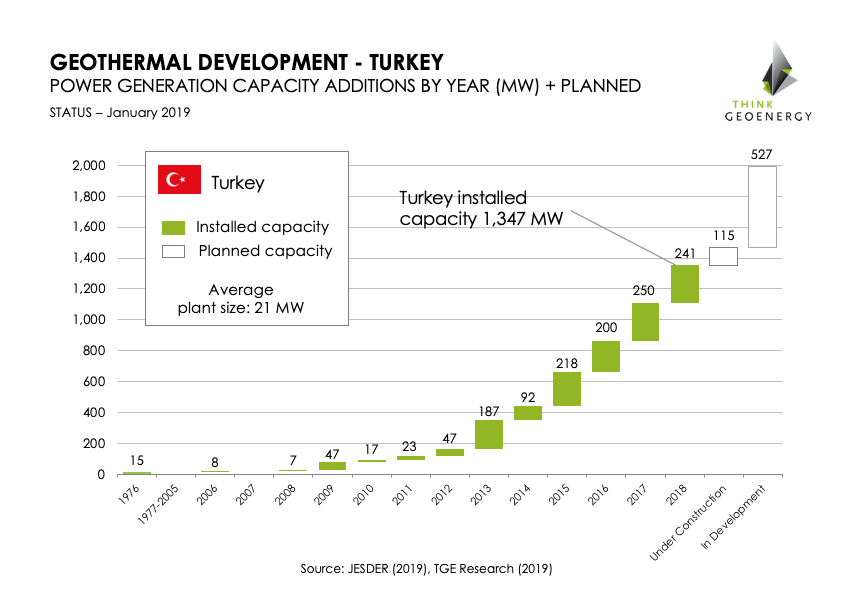Turkey targets 2,000 MW geothermal power generation capacity by 2020
According to the Turkish Geothermal Power Plant Investors Association (JESDER), Turkey plans to increase its geothermal power generation capacity to 2,000 MW by 2020, an increase of nearly 50% compared to year-end 2018.
Turkey wants to make better use of its geothermal energy potential and aims to achieve a geothermal based power generation capacity of 2,000 MW by 2020. The country has a current installed capacity of 1,347 MW. In an article aimed at highlighting the opportunities for German companies, German Trade & Invest draws a positive picture of the opportunities for geothermal in Turkey.
The Turkish energy policy relies on the expansion of renewable energies. Its aim is to reduce dependence on imported fossil fuels and curb the chronic trade deficit. Geothermal energy for power and heat generation is becoming increasingly important.
By the end of 2020, ie within less than two years, the power plant capacities are to increase to 2,000 MW and thus increase by almost 50 percent compared to 2018. According to the Turkish Association of Geothermal Investors (JESDER), the estimated power generation potential from geothermal sources in the western regions of the country amounts to around 3,000 megawatts. Currently, the share of geothermal energy in the total electricity production is just under 2.4 percent.
The potential for heating residential and commercial properties such as hotels, swimming pools and greenhouses is estimated at 30,000 MW.
Projects for district heating systems
According to the Turkish Geothermal Power Plant Investors Association (JESDER), the country basically has the opportunity to build up additional geothermal capacity of 200 to 250 megawatts per year with annual investments of about US $ 1 billion. The payback period is estimated at about five years. JESDER estimates the cost of a geothermal well of up to 4,000 meters and 60 to 80 days to be between $ 3 million and $ 4 million.
In the western Turkish provinces of Denizli, Manisa and Aydin, where there are numerous geothermal sources, special zones are already being built in which wastewater from geothermal power plants is to be used to heat greenhouses.
Of particular note is the project in the Sarayköy area near Denizli, where greenhouses will be built on an area of 650,000 square meters, which will house the wastewater from the Zorlu Enerji power plant. A similar project is planned in the Efeler area near Aydin.
In an interview with the Turkish business magazine “Ekonomist” (January 27, 2019), JESDER President Ali Kindap predicts that the proven potential corresponds to a total consumption of 9 billion cubic meters of natural gas worth US $ 2.2 billion The increased use of geothermal energy for district heating systems could save high foreign exchange expenditures. According to Kindap, geothermal systems could heat around 6 million households in western regions. Also in central and eastern Anatolia, there are abundant and economically exploitable geothermal sources, as emerges from the drilling of the state-owned oil company TPAO.
Companies plan capacity expansion
At the end of 2018, a total of 53 geothermal power plants were in operation in Turkey. In terms of installed capacity, Turkey is in fourth place worldwide according to JESDER. According to economist Zorlu Enerji (260 MW, http://www.zorluenerji.com.tr ), Gürmat Enerji (210 MW, http://www.gurmat.com.tr ), Celikler Enerji ( 181 MW, http://www.celiklerholding.net ), Maren Maras Elektrik (149 MW, http://www.kipas.com.tr ) and Türkerler Enerji (78 MW, http://www.turkerler.com/ enerji ). Zorlu Enerji, which owns five geothermal power plants, plans to create additional capacity of 50 MW by the end of 2020.
Maren Maras Elektrik, a subsidiary of the Kipas Holding with eight power plants, plans to install an additional 30 MW by the end of 2020. Enerjeo Kemaliye Enerji Üretim ( http://www.enerjeo.com ) intends to increase its capacity to 200 MW, based on currently 25 megawatts.
Opportunities for technology providers
The Turkish government is subsidizing investments in geothermal energy under the Renewable Energy Promotion Mechanism (YEKDEM). Among other things, companies receive tax benefits and power purchase guarantees for ten years. This subsidy system, introduced in 2005, will initially run until 2020. Projects completed by then will benefit from the benefits. Whether and to what extent it will be funded is still unknown.
The IGC Turkey Geothermal Congress & Expo will again provide a great opportunity to connect with this growing geothermal market, which has shown the fastest growth in geothermal development not only in recent year.
Source: German Trade and Invest



















